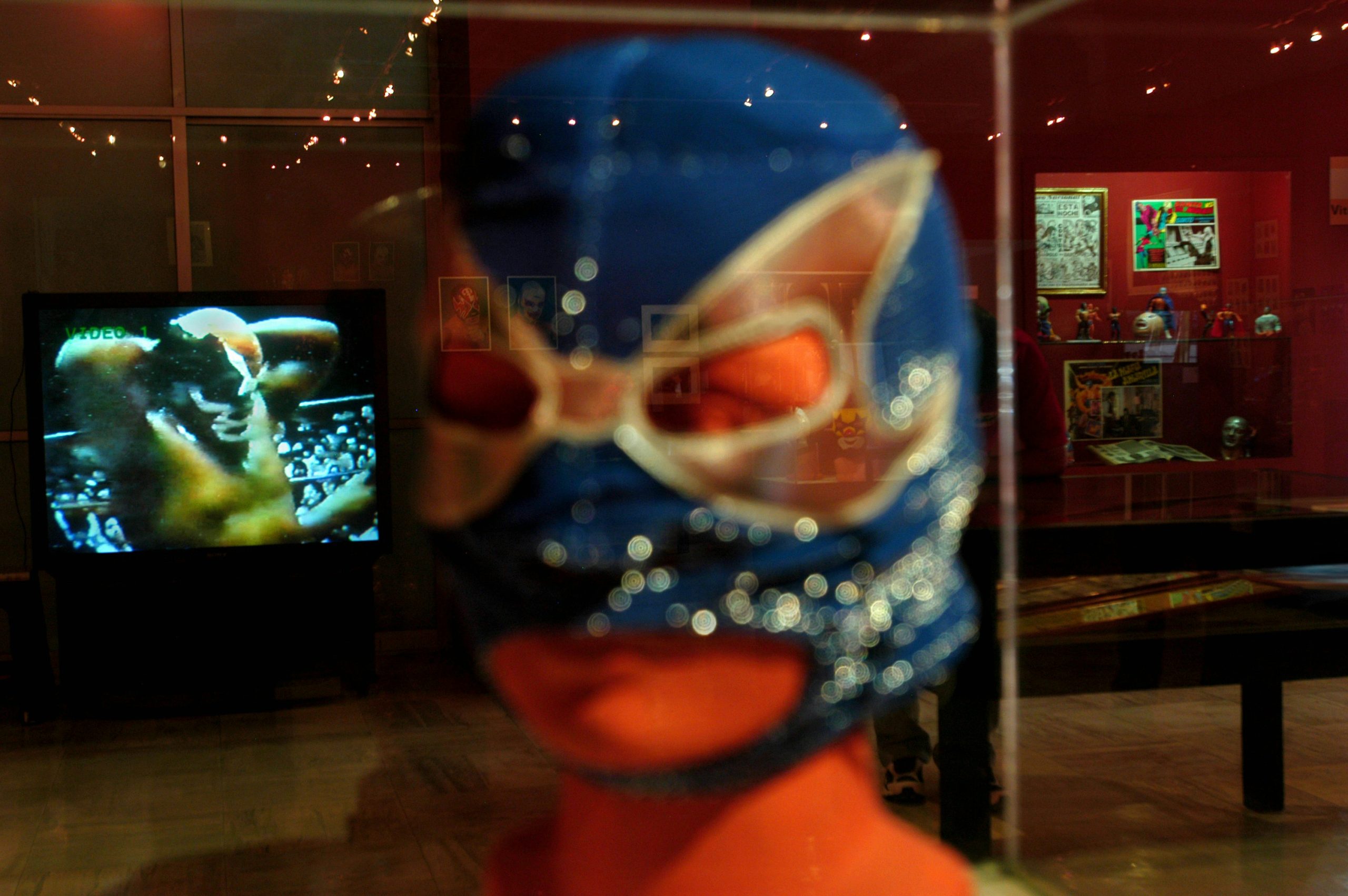Events advisor and experience designer Andrew O’Loughlin explains how the Hero’s Journey storytelling template can be adopted by event and experience designers to get people to not only sign up to your experience, but to revisit it again and again.
We know a large part of the motivation for people to participate in your events and activities is to have an experience – something different and better than everyday life. While we are all looking to provide “seamless” experiences, we also know that people are looking for a bit more adventure than that – and what may make your event a priority in their life (and over other ways of spending their time and money) is giving them their own, real-life “hero’s journey”.
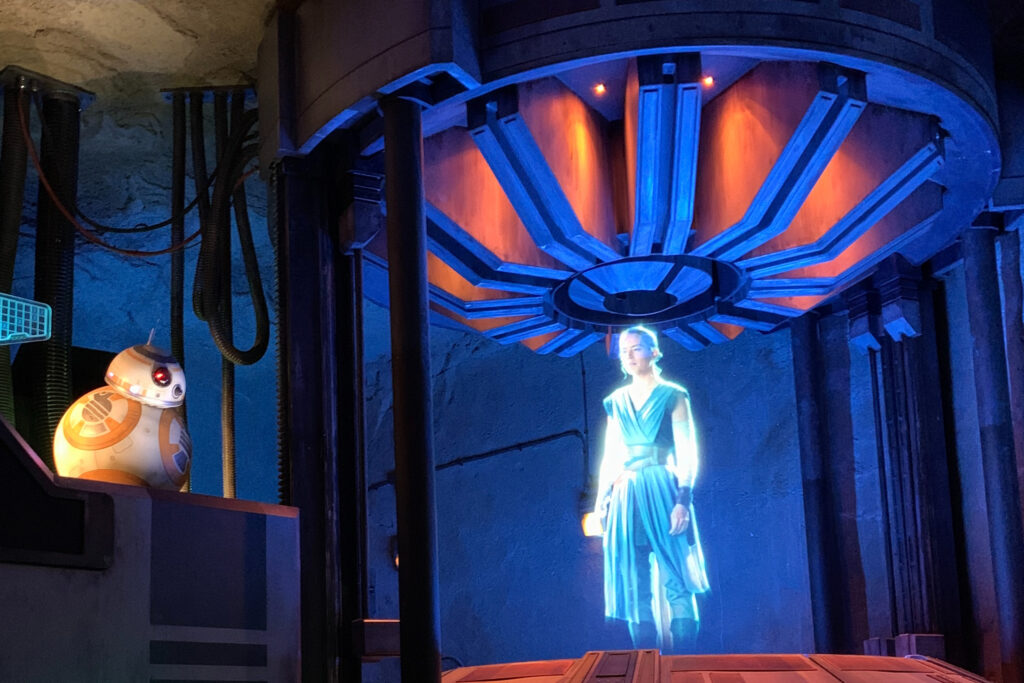
You may have heard about the Hero’s Journey story structure somewhere – but even if you haven’t, there’s no doubt you will have seen it in your favourite movies and it’s probably in the events and activities that you provide.
Joseph Campbell’s “Hero’s Journey” is the common template of stories that involve a character who (often reluctantly) goes on an adventure, is challenged but succeeds in the decisive moment, and comes home changed or transformed.
It’s been in each Star Wars, Harry Potter and Spider-Man movie, The Lion King, The Lord of the Rings, the Die Hards and all of the Rockys!
It’s proven to be a valuable formula for movie makers. And it’s a journey that you can provide in your events, campaigns, and activities.
It’s the storyline behind the success of many movies, books and forms of entertainment, and it could well be valuable for you. Because just like characters in the movies, we ask our participants, fans, or volunteers to go on a journey with us – but in our case, in their own real-life story.
Make your customer the hero
If you’re looking at ways to get people to sign up and show up again, making them a character in their own real-life story could be a good start. A “hero” within your event or activity experience. Something they personally live through; a meaningful event, a novel or challenging experience, or one that has an unknown outcome. This gives them something to think about, to feel good about, to talk about at the café or around the barbecue, and, yes, to share on their socials.
Giving people the chance to escape the “ordinary world” and add new experiences to their own real-life story is extremely valuable for them – and for you.
Take a fun run participant, or someone signing up for a new workout studio, or my kids signing up for swimming lessons, or a fan of a footy team – it all starts with a call to action, then provides an experience, then a return to everyday life.
Finding your hero’s journey
There are a few parts to it, but in the short version the 12 stages of the hero’s journey may be organized into three “acts” or parts: the start, the middle and the end.
1. The Departure: a call to adventure
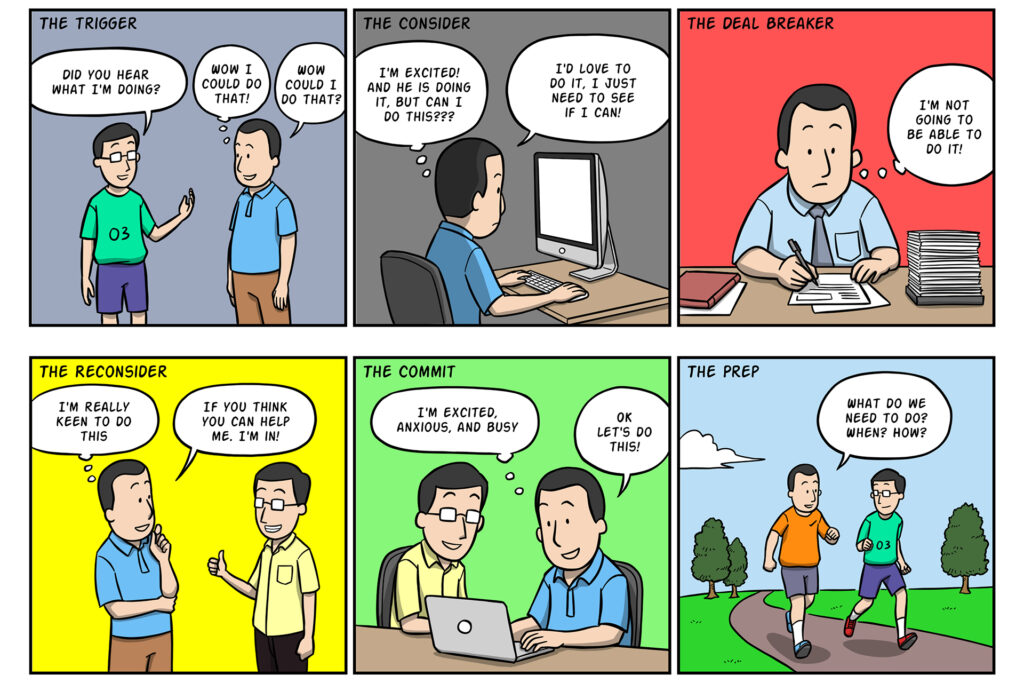
At the start of the journey, the hero lives in the ordinary world and receives a call to go on an adventure – like Luke Skywalker or Frodo or Harry Potter, or signing up for your event or program. Like when a workmate suggests you come along to a park run, or a dad asks his daughter if she wants to play cricket, or tells his son he needs to learn to swim, or follow a football team! Whatever it is, our heroes need a call to adventure.
The reluctant hero
But often the “hero” in our stories is reluctant to follow the call – too busy, scared or unsure if it’s for them or what it may involve. But luckily in the movies, they are helped by a “mentor figure” – like Obi-Wan Kenobi, Gandalf or Hagrid – and just like in the movies, it is the same in your events and activities. Their friends, parents, or a workmate play the “mentor” or support role. And, as the organiser or provider of the experience, you also play a pivotal role: you are the guide, and you can support the heroes, the participants or volunteers in taking on the journey.
2. The Journey: action in the “special world”
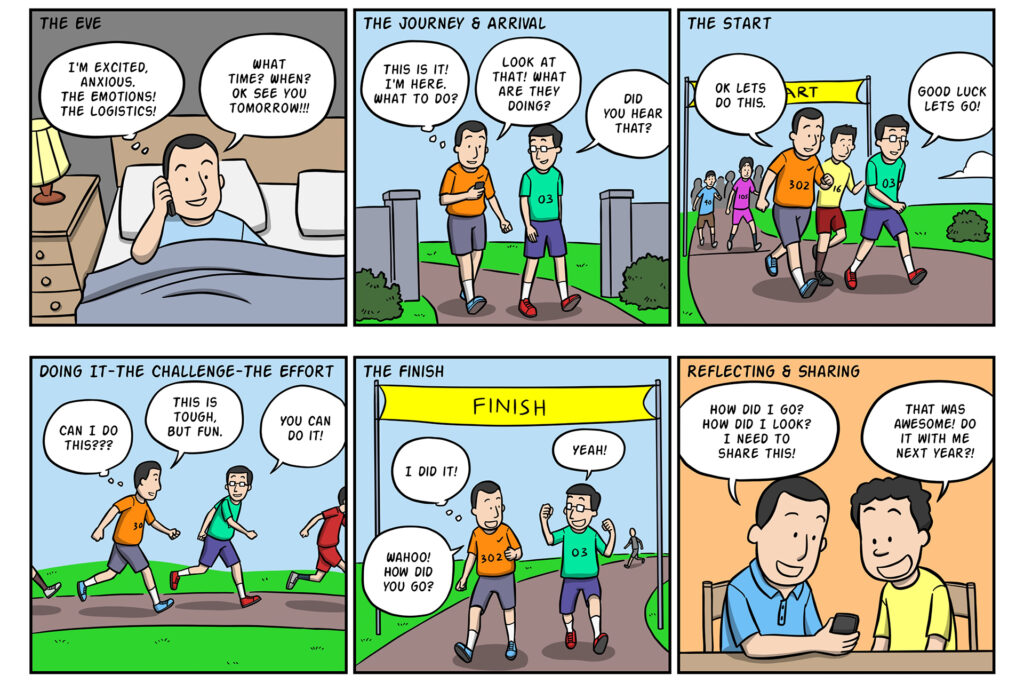
The next phase of our story begins with the hero committing, signing up and crossing the threshold into the unknown, into a “special world” – just like what we would hope our events and activities would be seen to be! – where they face activities and experiences, either alone or with the assistance of “helpers” – their friends, your staff or volunteers.
After experiencing these new activities or novel experiences, our hero eventually reaches the “central crisis”, or a meaningful challenge within their adventure, where they must undergo “the ordeal”. It’s that pivotal scene in the movie – “that point” on a long run, or those nervy, uncomfortable steps of a new experience, an unknown activity, or in the case of the fan, the uncertainty of just trying to win a game! Fortunately, at this point, they overcome the main obstacle or enemy – finish the run, complete the activity, win the game – reaching the climax and gaining their reward (or “treasure”) – the medal, the satisfaction, the self-belief, or celebration.
3. The Return: back to everyday life
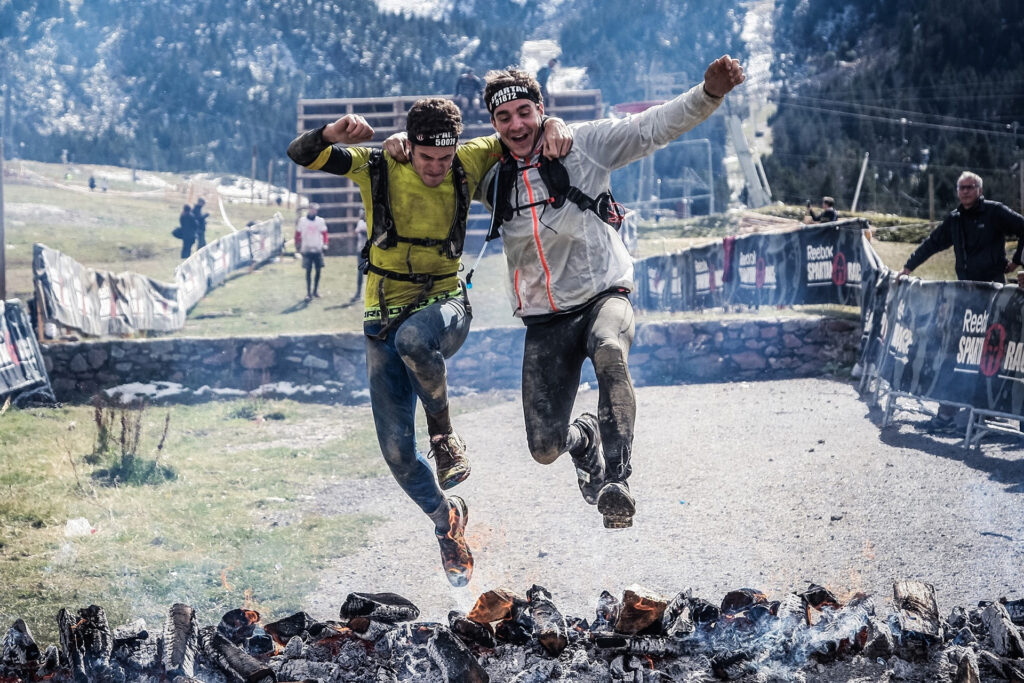
But then our hero must return to the “ordinary world” of day-to-day life and face new challenges, or they may become distracted by everyday life. We may pursue them again, and they may be reluctant to return. It’s likely they will need some more triggers or influences to intervene – like Luke Skywalker ultimately deciding to become a Jedi, or your runner returning next time, the kids committing to a new sport, or you developing a new ritual at your gym – the hero returns.
Like the sequels in each movie, we want our heroes to sign up and show up again, and again… In the final phases of this journey, the hero again traverses the threshold between “the ordinary” and your “special world”, returning to the daily life with the rewards they gained. They may use these rewards for themselves or for the benefit of their fellow characters. Like Rocky did again, and again, and then shared with his son, our heroes will keep showing up to do it again, and ideally, bring others with them…
Importantly, if we have done our jobs well, we have influenced our hero: they are transformed by the adventure and gain – if not “the prize”, victory, or the guy or girl like in the movies – they do gain rewards. Our heroes are able to do more of something – your sport or activity – they feel like they belong more, or have even become more as a person. And they may become advocates or evangelists for your event or activity, bringing others on the next journey with them.
Why is this useful for you?
Success stories like Ironman have done a great job of creating a hero journey and placing their potential participants within it.
Influential events and activities allow people to be, and become, who they want to be, and they show people who we are. All these reasons are important and valuable for us to promote!
So if you’re looking at ways to get people to sign up and show up again, and again, making them the key character in their own story and showing them as the hero of your activity and their experience could be a good place to start.
It also seems like we are all going through our own hero’s journey right now, having taken on some adversity, overcome it, and looking at what’s next. But we all need support to navigate our way.
About the Author
Andrew O’Loughlin is an events advisor and experience designer specialising in sports experience design. He creates design-led, evidence-based sports events, fan experience campaigns, and participation programs that have the influence that they need to have. He has worked with leading teams at World Cups, World Championships and Games event and led a leading international sports Events Agency working with innovative global brands like Nike, ESPN & Red Bull.
- For a brilliant account of the Hero’s Journey, check out WXO Founder James Wallman’s book, Time and How to Spend It.
To get more insights from experts in the experience economy like Andrew – and to be the first to know about our membership programme, events and more – sign up to the WXO community here.




